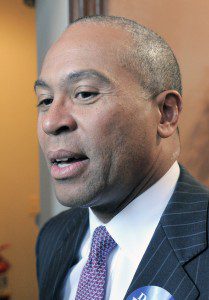
FILE – This Dec. 17, 2013 file photo shows anti-abortion protester Eleanor McCullen, of Boston, left, standing at the painted edge of a buffer zone as she protests outside a Planned Parenthood location in Boston. (AP Photo/Steven Senne, File)
STEVE LeBLANC, Associated Press
BOSTON (AP) — Massachusetts lawmakers should proceed cautiously to avoid future lawsuits as they consider altering security rules around abortion clinics in the wake of a recent U.S. Supreme Court ruling, a group that opposes abortion said yesterday.
In a letter sent to all House and Senate members, Massachusetts Citizens for Life expressed concern about legislation being crafted “that in all likelihood will lead to more litigation,” because it could infringe on the rights of anti-abortion protesters to use public sidewalks to speak with or distribute literature to women entering a clinic.
In last month’s unanimous decision, the high court struck down the state’s 35-foot buffer zone law, deeming it a restraint on the free-speech rights of anti-abortion protesters.
Attorney General Martha Coakley and Gov. Deval Patrick have said a bill was being prepared that would address the concerns of the justices, with the hope it could be approved before the legislative session ends July 31.
The specifics of the proposal have yet to be announced, although Coakley has said one option would be to give police more power to disperse crowds. Operators of the clinics, which also offer services other than abortion, have pointed to past efforts by some protesters to block entranceways.
The bill could be filed this week.
In their letter, leaders of Massachusetts Citizens for Life said the buffer zone law, passed seven years ago, also came with assurances that it would stand up in court.
“As you consider voting on the attorney general’s new proposal, please think carefully as to whether or not the latest version will pass constitutional muster. Remember, she convinced you before that her bill would do so, and she was dead wrong,” the letter stated.

Massachusetts Attorney General Martha Coakley, a candidate for governor in the upcoming Democratic primary, shares a laugh with Westfield resident Carole Cummings and Norma Hill of the city’s Democratic City Committee during a campaign stop in May at Leo’s Gallery Deli in downtown Westfield. (File photo by Carl E. Hartdegen)
Coakley reiterated her intention to protect access to clinics while respecting the rights of protesters.
“Women deserve to be able to access their constitutional right to reproductive health care free from intimidation and threats,” she said in a statement.
Yesterday Coakley and other public officials and abortion rights activists spoke before hundreds of protesters at a rally on Boston City Hall Plaza.
“Let’s just not get angry, let’s get even,” Coakley told the crowd. “Massachusetts is pro-choice and we will continue to be pro-choice.”
Boston Mayor Martin Walsh also spoke at the rally, where he was joined by Salem Mayor Kim Driscoll, Gloucester Mayor Carolyn Kirk, Fitchburg Mayor Lisa Wong and Newburyport Mayor Donna Holaday.
Walsh said municipalities still have laws that can help protect women entering clinics.
“We’re going to make sure in our cities and towns that we enforce our own laws to make sure that women have the right to safe health” care access, he said.
Coakley said the bill could also help guard access to driveways leading to clinics and could adopt on a state level some of the protections included in the federal Freedom of Access to Clinic Entrances Act.
Associated Press writer Bob Salsberg contributed to this report.


